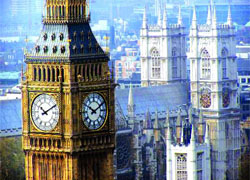
British aid money has been given by the European Union to help the security forces
of the last dictatorship in Europe.
Funds intended to help the world’s neediest have been spent on providing training and equipment to the police force and border guards of Belarus, an autocracy run along Soviet lines. The aid, supplied by the European Union’s EuropeAid programme, to which Britain’s Department for International Development (DfID) is a major donor, came despite violent action against the pro-democracy opposition.
The Foreign Office has expressed grave concern at the imprisonment and abuse of dissidents and also at the use of the death penalty, while an EU arms embargo has been put in place. However, the EU increased aid payments to Belarus to more than £32 million last year, including millions of pounds on projects to reinforce the country’s western borders.
The European Commission said the aid would curb people trafficking and drug smuggling, but dissidents claimed the equipment has been used to prevent the regime’s opponents fleeing.
Labour said the aid to Belarus was unjustifiable and urged ministers to raise it with the commission.
David Cameron is committed to spending 0.7 per cent of GDP on foreign aid, but Britain has direct control over only part of the budget, with more than 40 per cent distributed through third parties.
The EuropeAid programme receives £1 billion from DfID. The Brussels scheme has in turn spent £68 million since 2007 in Belarus, under the “neighbourhoods policy” designed to promote democracy in countries bordering or near the EU, and prevent illegal migration to the EU.
Procurement documents show Belarus has been bought equipment including motorcycles, patrol boats, swamp vehicles and thermal imaging cameras for border guards.
The list included £279,000 to buy and house guard dogs, £8.4 million on mobile X-ray machines and cameras to inspect cars crossing the borders, and £6.7 million on a computerized criminal records database and portable equipment to check biometric data.
The aid agency trained border guards in “document integrity, detection of forgeries and impostor recognition” and spent millions to clear the border strip and install new checkpoints, telephones and CCTV networks.
Human rights monitors are severely critical of Belarus, which has been ruled by Alexander Lukashenko, the so called president, since 1994. He has retained the KGB and other Soviet-era ministries, is accused of running death squads for political opponents and has named his son Kolya, nine, who carries a golden handgun, as his “heir”. He said last year:
“I am the last and only dictator in Europe.”
Presidential elections in December 2010 were declared “fraudulent” by the American Senate, while the US and Europe have placed a travel ban and asset freeze on some regime officials.
Natalia Kaliada, director of the underground Belarus Free Theatre, accused Brussels of propping up the regime, which does not want its critics free to campaign.“With such equipment they would block all possibilities of escape completely. It would be a completely isolated country,” she said.
Jim Murphy, the Labour shadow development secretary, said there was no justification for aid to go to Belarus and called on ministers to take it up with the European Commission. “Aid is vital to help alleviate poverty and to support UK national security and economic interests. It should not support regimes in countries of concern with alarming human rights records,” he said. “Ministers must now urgently raise this matter with the European Commission to ensure no UK taxpayers’ money is being spent in ways which undermine our national interests or values.”
Sir Menzies Campbell, the former Liberal Democrat leader who sits on the Foreign Affairs Select Committee, said: “Before financing equipment of this kind you have to assess the balance of risks of illegal breaches of the border against the reality of an unpleasant regime which cares very little for the human rights of its citizens. “If there is a suggestion that this equipment is being exploited we should think very carefully about continuing to provide it.”
DfID said its ministers were aware of the aid to Belarus and supported Europe’s policy of “critical engagement” with the regime. A spokesman for the European Commission said: “EU support for Belarus is all about promoting democracy and human rights and where necessary pushing the Belarusian authorities hard, whilst supporting civil society that seeks to hold them to account.”
Matthew Holehouse, The Telegraph.

